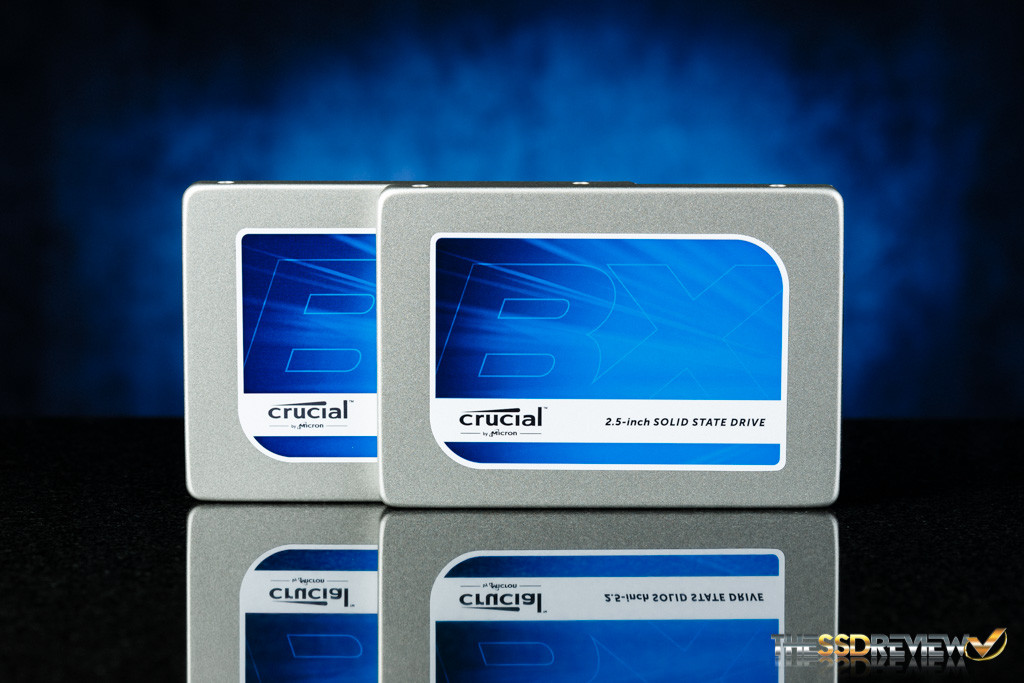In today’s SSD of the Week we look back at Crucial’s new entry-level SSD that we reviewed a couple of months ago, the BX100. This SSD was one of the first value oriented SSDs released following CES. Therefore, it set the price point of the entry-level SSDs to be very cheap and has brought about a very competitive market among these SSDs. Furthermore, the BX100 is among the first value SSDs to have capacities up to 1TB allowing a greater consumer base to have access to these storage capabilities.
The Crucial BX100 is available in the 7mm 2.5” form factor and comes in the 120GB ($67.99), 250GB ($99.00), 500GB ($179.99), and 1TB ($379.99) capacities. The sequential read and write for this SSD is rated up to 535 MB/s and 450 MB/s respectively. Also, the BX100 is rated up to 90k for the random read IOPS and 70k for write. Additionally, this SSD has a MTBF rating of 1.5 million hours and an endurance rating of 72TB written. The BX100 also comes with a 3-year warranty.
When looking at the features of this SSD we see the basic list of thermal monitoring, data path protection, active garbage collection, TRIM support, Self Monitoring and Reporting Technology (SMART), and Error Correction Code (ECC). Even though this may not seem like much compared to higher end SSDs, remember that the BX100 is very much a value oriented SSD. It is powered by the recently popular Silicon Motion SM2246EN controller and coupled with Micron’s 128Gbit 16nm MLC NAND enables this SSD to have high performance at low cost.
Whether you are a new SSD consumer looking for a cheap basic SSD or just looking for a solid storage SSD, the Crucial BX100 will meet your needs. It has received our Gold Seal in our review.
 The SSD Review The Worlds Dedicated SSD Education and Review Resource |
The SSD Review The Worlds Dedicated SSD Education and Review Resource | 


this is still the best value SSD out there. great pricing, good performance, I upgraded all 3 of my HDDs to this SSD (only one a 1TB). I have used Intel/Samsung SSDs before but they are more expensive and actually slower performance after you use them for a while
Take a look at the Toshiba Q Series Pro 256GB for $99 at Best Buy. Sustained Sequential Read:554MBps. Sustained Sequential Write:512MBps. Premium nand, this is a pro not a entry-level ssd.
That thing really has poor consistency due to lack of dram. And besides, it pretty related to ocz stuff (controller, firmware).
I think arc 100 is a better deal
This is a quote from ssdreview of the Toshiba Q Series Pro ” AS SSD Copy Benchmark also shows some of the strongest transfer speeds and times we have seen in awhile for similar form factor SSDs “. Toshiba Pro vs Samsung 850 Pro. Toshiba iso 448.97 program 337.92 game 428.70 MB/s. Samsung iso 463.62 program 231.80 game 398.48 MB/s. The arc 100 is not even in this class. And the Toshiba beats the Samsung Pro in file transfers all for $99 How is that not the best deal out?
Because its not all about raw/peak numbers.
Yes, arc 100 has lower peak performance, but will flat out destroy toshiba in performance consistency thanks to its newer controller, dram buffer! and bigger overprovisioning.
This shows it all
https://www.cdrlabs.com/images/stories/reviews/toshiba_q_series_pro_ssd/toshiba%20q%20series%20pro%20256gb%20hd%20tach%20dirty.png
I clicked on the link and looked at the Toshiba part number and it looks like its a different ssd from the Toshiba Q Series Pro. Am I missing something? Your link is to the HG6 series.
After some more research I found the review that your link
is to. the review seemed to be atleast 95% positive, and this was with it compared to the Samsung 840 Pro. And yes your link is to the Q Series Pro, not the HG6 series, my bad.
Yeah, it is q pro.
Really, i was just trying to show this drives weakness. Its not just great numbers most review show you. In some situations, such poor consistency could really be annoying.
Seeing how both drives cost the same and have the same warranty, its up to the buyer which tradeoffs he can take 🙂
The fact that it achieves these numbers without dram buffers
shows how much faster the nand is. it’s a plus not a minus.